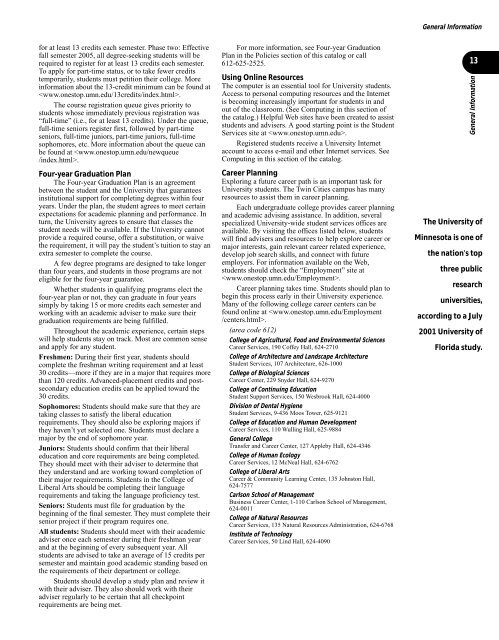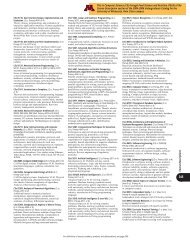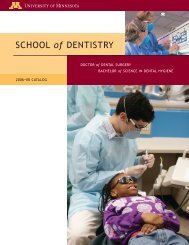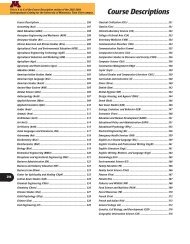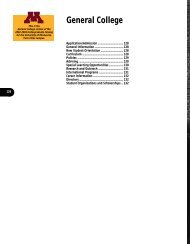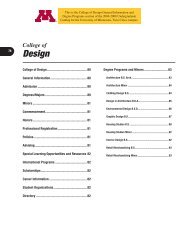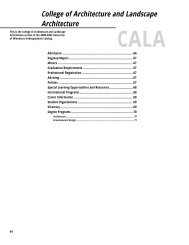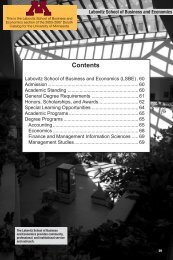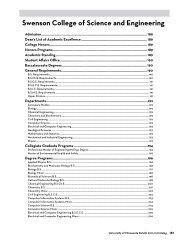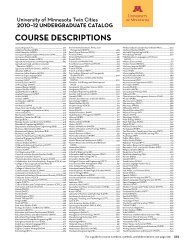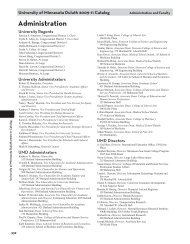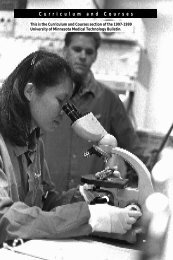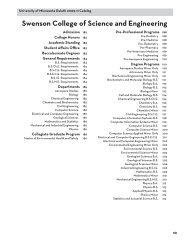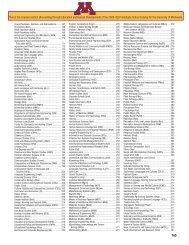Introduction, Degree Program/Majors Directory, General Information ...
Introduction, Degree Program/Majors Directory, General Information ...
Introduction, Degree Program/Majors Directory, General Information ...
You also want an ePaper? Increase the reach of your titles
YUMPU automatically turns print PDFs into web optimized ePapers that Google loves.
<strong>General</strong> <strong>Information</strong><br />
for at least 13 credits each semester. Phase two: Effective<br />
fall semester 2005, all degree-seeking students will be<br />
required to register for at least 13 credits each semester.<br />
To apply for part-time status, or to take fewer credits<br />
temporarily, students must petition their college. More<br />
information about the 13-credit minimum can be found at<br />
.<br />
The course registration queue gives priority to<br />
students whose immediately previous registration was<br />
“full-time” (i.e., for at least 13 credits). Under the queue,<br />
full-time seniors register first, followed by part-time<br />
seniors, full-time juniors, part-time juniors, full-time<br />
sophomores, etc. More information about the queue can<br />
be found at .<br />
Four-year Graduation Plan<br />
The Four-year Graduation Plan is an agreement<br />
between the student and the University that guarantees<br />
institutional support for completing degrees within four<br />
years. Under the plan, the student agrees to meet certain<br />
expectations for academic planning and performance. In<br />
turn, the University agrees to ensure that classes the<br />
student needs will be available. If the University cannot<br />
provide a required course, offer a substitution, or waive<br />
the requirement, it will pay the student’s tuition to stay an<br />
extra semester to complete the course.<br />
A few degree programs are designed to take longer<br />
than four years, and students in those programs are not<br />
eligible for the four-year guarantee.<br />
Whether students in qualifying programs elect the<br />
four-year plan or not, they can graduate in four years<br />
simply by taking 15 or more credits each semester and<br />
working with an academic adviser to make sure their<br />
graduation requirements are being fulfilled.<br />
Throughout the academic experience, certain steps<br />
will help students stay on track. Most are common sense<br />
and apply for any student.<br />
Freshmen: During their first year, students should<br />
complete the freshman writing requirement and at least<br />
30 credits—more if they are in a major that requires more<br />
than 120 credits. Advanced-placement credits and postsecondary<br />
education credits can be applied toward the<br />
30 credits.<br />
Sophomores: Students should make sure that they are<br />
taking classes to satisfy the liberal education<br />
requirements. They should also be exploring majors if<br />
they haven’t yet selected one. Students must declare a<br />
major by the end of sophomore year.<br />
Juniors: Students should confirm that their liberal<br />
education and core requirements are being completed.<br />
They should meet with their adviser to determine that<br />
they understand and are working toward completion of<br />
their major requirements. Students in the College of<br />
Liberal Arts should be completing their language<br />
requirements and taking the language proficiency test.<br />
Seniors: Students must file for graduation by the<br />
beginning of the final semester. They must complete their<br />
senior project if their program requires one.<br />
All students: Students should meet with their academic<br />
adviser once each semester during their freshman year<br />
and at the beginning of every subsequent year. All<br />
students are advised to take an average of 15 credits per<br />
semester and maintain good academic standing based on<br />
the requirements of their department or college.<br />
Students should develop a study plan and review it<br />
with their adviser. They also should work with their<br />
adviser regularly to be certain that all checkpoint<br />
requirements are being met.<br />
For more information, see Four-year Graduation<br />
Plan in the Policies section of this catalog or call<br />
612-625-2525.<br />
Using Online Resources<br />
The computer is an essential tool for University students.<br />
Access to personal computing resources and the Internet<br />
is becoming increasingly important for students in and<br />
out of the classroom. (See Computing in this section of<br />
the catalog.) Helpful Web sites have been created to assist<br />
students and advisers. A good starting point is the Student<br />
Services site at .<br />
Registered students receive a University Internet<br />
account to access e-mail and other Internet services. See<br />
Computing in this section of the catalog.<br />
Career Planning<br />
Exploring a future career path is an important task for<br />
University students. The Twin Cities campus has many<br />
resources to assist them in career planning.<br />
Each undergraduate college provides career planning<br />
and academic advising assistance. In addition, several<br />
specialized University-wide student services offices are<br />
available. By visiting the offices listed below, students<br />
will find advisers and resources to help explore career or<br />
major interests, gain relevant career related experience,<br />
develop job search skills, and connect with future<br />
employers. For information available on the Web,<br />
students should check the “Employment” site at<br />
.<br />
Career planning takes time. Students should plan to<br />
begin this process early in their University experience.<br />
Many of the following college career centers can be<br />
found online at .<br />
(area code 612)<br />
College of Agricultural, Food and Environmental Sciences<br />
Career Services, 190 Coffey Hall, 624-2710<br />
College of Architecture and Landscape Architecture<br />
Student Services, 107 Architecture, 626-1000<br />
College of Biological Sciences<br />
Career Center, 229 Snyder Hall, 624-9270<br />
College of Continuing Education<br />
Student Support Services, 150 Wesbrook Hall, 624-4000<br />
Division of Dental Hygiene<br />
Student Services, 9-436 Moos Tower, 625-9121<br />
College of Education and Human Development<br />
Career Services, 110 Wulling Hall, 625-9884<br />
<strong>General</strong> College<br />
Transfer and Career Center, 127 Appleby Hall, 624-4346<br />
College of Human Ecology<br />
Career Services, 12 McNeal Hall, 624-6762<br />
College of Liberal Arts<br />
Career & Community Learning Center, 135 Johnston Hall,<br />
624-7577<br />
Carlson School of Management<br />
Business Career Center, 1-110 Carlson School of Management,<br />
624-0011<br />
College of Natural Resources<br />
Career Services, 135 Natural Resources Administration, 624-6768<br />
Institute of Technology<br />
Career Services, 50 Lind Hall, 624-4090<br />
13<br />
<strong>General</strong> <strong>Information</strong><br />
The University of<br />
Minnesota is one of<br />
the nation's top<br />
three public<br />
research<br />
universities,<br />
according to a July<br />
2001 University of<br />
Florida study.


